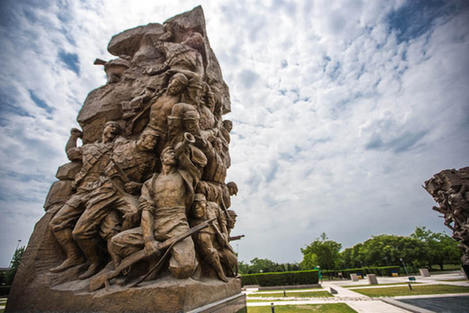Never Forget
The Second World War ended almost 70 years ago. People who witnessed the war first-hand are now in their twilight years, many have passed away. Yet, the war remains vivid in the world’s collective memory. It was a period when “disaster” ruled and, therefore, can never be forgotten.
On September 2, 1945, a representative of Japan officially signed the Instrument of Surrender on the deck of the USS Missouri, marking the final victory of the world’s war against fascism.
During this life-and-death war that reshaped the world, more than 60 countries and regions and over two billion people were involved; it is estimated that around 55 million to 70 million soldiers and civilians lost their lives. China was the main battlefield in the East. The nation fought the Japanese invading army, but paid for its victory with 35 million casualties.
|
 |
|
Remembrance set in stone: a sculpture in the War Memorial Sculpture Garden in Beijing. |
Collective Remembrance
History runs the danger of being confined to textbooks, closed and shelved. If a country or people were to forget their own history, it could be regarded as a betrayal of the past and of oneself. “Museums and memorial halls are the second classroom where the public can understand history,” said Li Zongyuan, deputy curator of the Museum of the War of Chinese People’s Resistance Against Japanese Aggression.
To maintain historical reality and advocate world peace, the museum has proposed the creation of a WWII museum alliance. “During years of exchange with WWII museums and memorial halls in other countries, we have come to realize that safeguarding historical reality is not the responsibility of one country or one museum; it should be the common goal of all people around the world who can put that spell of history in perspective,” said Li Zongyuan. “Therefore, we suggest WWII museums and memorial halls worldwide form an organization to launch exchange and cooperation, jointly maintain historical reality, and spread the concept of peace.”
In 2013, the museum held an exhibition at the Auschwitz-Birkenau State Museum in Poland. It invited a number of representatives from other war museums around the world, who unanimously agreed on the proposal to build an alliance of WWII museums. Invitations were sent to counterparts in Russia, Poland, Singapore, Korea, Japan, and the U.S. to consult on opinions and hopes for the collaboration. It is anticipated that the alliance will be officially inaugurated in 2015, the 70th anniversary of victory over fascism.
Great Contribution
China’s Anti-Japanese War was not an isolated incident but an important component of the wider world’s anti-fascist war, since China served as the main battlefield of the war in the East. “This orientation is accurate,” said Li Zong-yuan. “The Chinese people’s resistance consumed and weakened the strength of Japanese militarism, and dealt a lasting blow, especially after the outbreak of the Pacific War. Because most of the Japanese army were caught up in the China battlefield, military pressure on the Soviet Union, the U.S and Britain was lessened, which strategically and effectively bolstered the war against fascism.”
